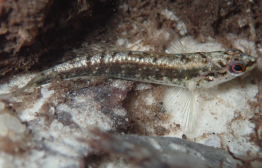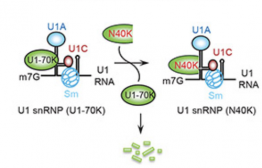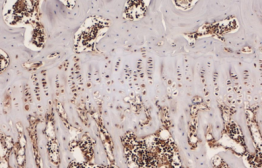As a Loyola student, you have the opportunity to work alongside our talented professors to partner in collaborative research. Learn more about some recent research and projects currently underway.
Conservation of imperiled Okaloosa Darters - Jordan Lab
Since 1992, Professor Frank Jordan and students from the Department of Biological Sciences and the Environment Program have been collaborating with stakeholders from the US Geological Survey, the US Fish & Wildlife Service, and the US Air Force to study the biology, ecology, and conservation of Okaloosa Darters. This species of small fish is geographically limited to six small streams that are located primarily on Eglin Air Force Base in northwestern Florida. These studies included annual population monitoring surveys at a network of about 20 sites; periodic range-wide surveys at over 50 sites; development of sampling statistics and evaluation of visual sampling methods; characterization of microhabitat abundance and use; restoration of impounded stream sections; analysis of population genetic structure; analysis of movement and longevity; and most recently quantifying effects of canopy removal. Collectively, results of these studies largely informed the decision to remove (delist) the species from the Endangered Species List in July 2023. This is a significant conservation milestone because – once listed – few species are recovered enough to come off the List. Read more about this research here.
Biology Research Seminar Series
Before exploring the various research programs of our faculty below, note that the Department of Biological Sciences holds a series of seminars each Fall and Spring semester in which guest speakers from around the country present their latest research findings. Attending these talks provides a great opportunity to learn about different kinds of research currently being conducted in of life sciences.
A list of this semester's lineup and an archive of past research seminars is provided here. Seminars are typically on Tuesday at 12:30 in Monroe Hall 610.
Effects of aging on cognitive function - Earls lab
The Earls Laboratory is interested in developmental processes that occur in the adult brain. Rather than treat the adult brain as a monolith, we study how the brain continues to execute programmed molecular changes well into adulthood. Our studies are focused on the hippocampus, a region of the brain that is important for learning and memory, and which ages according to a unique molecular program. We use electrophysiology, behavior, genetics, molecular biology and biochemistry to determine the rules that govern hippocampal maturation during early adulthood. These studies have important implications for understanding cognitive diseases, many of which emerge only within specific stages of adulthood. By studying normative early aging, we can better understand the age-dependent cognitive symptoms of diseases such as schizophrenia. More info coming soon.
Molecular mechanisms of arthritis - Mix Lab
Arthritis is a major public health problem and one of the leading causes of disability worldwide. Genetic and environmental factors contribute to the onset of degenerative joint diseases such as osteoarthritis and rheumatoid arthritis. The heterogeneity of these chronic diseases presents therapeutic challenges and joint replacement surgery remains the only viable strategy to restore joint function in advanced disease. Research led by Dr. Kim Mix aims to elucidate the molecular and cellular events driving cartilage degradation and synovial inflammation in arthritis. Learn more about this research here.
Neurobiology of Stress and Substance Use Disorder
Dr. Claire Stelly specializes in behavioral neuroscience and the neurobiology of stress and substance use disorders. She is passionate about kindling students' scientific curiosity and helping them develop the habits of mind necessary for rigorous research. Dr. Stelly’s lab investigates the neural processes by which stressors influence species-specific motivated behaviors in model organisms.
Neural Correlates of Cognition, Stress, and Resilience
Dr. Kate Yurgil’s research examines complex relationships between the brain, cognition, and health by using a variety of methodological techniques, including cognitive tests, psychological assessments, and electroencephalography (EEG) to measure electrical brain activity. Dr. Yurgil’s primary interests include determining biopsychosocial predictors of traumatic stress and resilience, as well as understanding individual differences in perception, memory, and executive functions. Understanding the nature of these differences is an important step in supporting neurodiversity, improving cognitive performance, and promoting healthy behaviors and outcomes.
Trauma, Race/Ethnicity, and Education (TREE) Lab
Dr. Silverstein's Trauma, Race/Ethnicity, and Education (TREE) lab investigates trauma sequelae, the impact of the COVID-19 pandemic on behavioral health, and mentorship of racial and/or ethnic minority undergraduate students. A major goal of the TREE lab is to include Loyola undergraduate and graduate research assistants at all steps of the research process so that they can hone their skills and pursue health/education-equity driven research careers of their own.
Trauma sequelae: The lab is currently most interested in examining the psychometric properties of trauma-related assessment tools for people of color, as these tools can lack cultural relevancy. By improving these tools, researchers can have a more accurate picture of how trauma-related constructs manifest in diverse individuals, leading to more effective treatments and increased health equity.
COVID-19 and behavioral health: The lab focuses on how existing disparities (e.g., physical and mental health, financial) have been exacerbated by the pandemic. The lab also focuses on how COVID-19-related bias, stigma, and discrimination (particularly xenophobic behavior) can be measured and intervened upon to improve health outcomes.
Mentorship: The lab's research on mentorship of racial and/or ethnic minority undergraduate students focuses on the relationship between White mentors (i.e., faculty members) and Black mentees (i.e., undergraduate students). Using qualitative methods, we examine Black mentees' perceptions of the positive and negative traits of their mentors with the ultimate goal of designing a guide for White mentors to improve their mentorship skills.
Molecular Neurobiology in the Aging Brain
Dr. Laurie Earls uses rodent models to investigate molecular processes that impact brain development over the lifespan. Her studies focus on molecular changes that occur in the hippocampus, a region of the brain that is important for learning and memory. Dr. Earls uses electrophysiology, behavior, genetics, molecular biology and biochemistry to determine the rules that govern hippocampal maturation during early adulthood. These studies have important implications for understanding cognitive diseases, many of which emerge only within specific stages of adulthood.
Research projects have moved.
Our faculty research projects have been merged into the achievements section. You can find them by clicking the achievements tab and sorting by "faculty achievements."
Recent publications of English Faculty
Dr. Hillary Eklund:
"Teaching Social Justice Through Shakespeare"
https://edinburghuniversitypress.com/book-teaching-social-justice-throug...
Dr. Christopher Schaberg:
"Pedagogy of the Depressed"
https://www.bloomsbury.com/us/pedagogy-of-the-depressed-9781501364594/
Dr. Mark Yakich:
"Football"
https://www.bloomsbury.com/us/football-9781501367069/
"Poetry: A Survivor's Guide (Edition 2):
https://www.bloomsbury.com/us/poetry-a-survivors-guide-9781501376214/
Dr. Charles Cannon:
"I Want Magic"
https://ulpress.org/products/i-want-magic-essays-on-new-orleans-the-sout...










